Analysis of Management Accounting Role in Strategic Management
VerifiedAdded on 2020/03/16
|14
|3009
|37
Report
AI Summary
This report analyzes the crucial role of management accounting within strategic management processes. It begins by outlining the extent to which management accounting practices are used in strategic decision-making, emphasizing the importance of accurate and timely information. The report then delves into specific tools and techniques, such as the balanced scorecard and activity-based costing, illustrating their application with real-world examples. Furthermore, it explores strategic management accounting initiatives, including activity-based costing, just-in-time management, and total quality management, and their impact on organizational performance. Finally, the report examines factors influencing the effective implementation of management accounting practices, such as organizational position, the relationship with the CEO, organizational culture, and credibility, providing insights into how to overcome potential challenges and ensure successful integration of these practices. The report concludes by underscoring the significance of management accounting in fostering informed decision-making and driving organizational success.
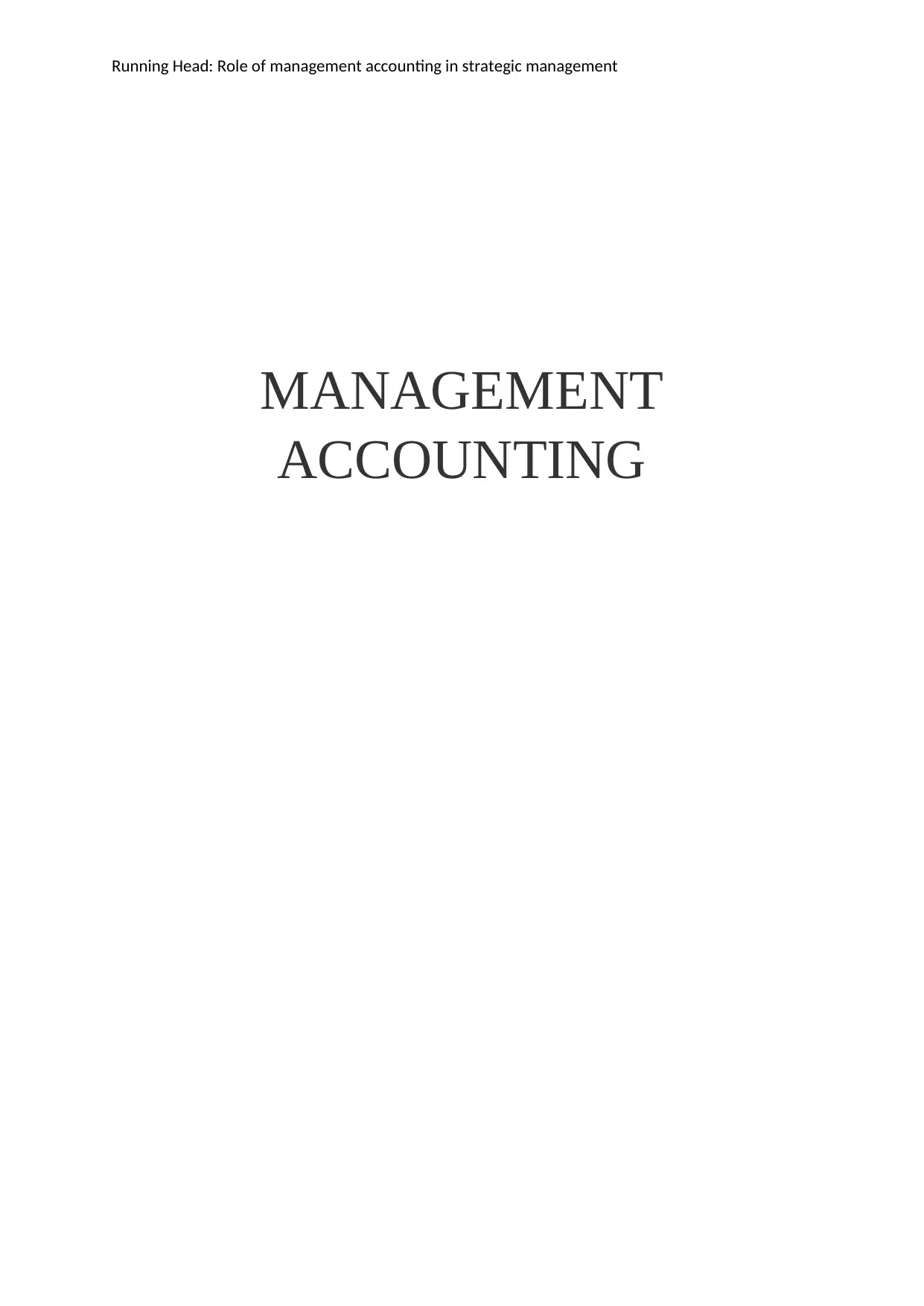
Running Head: Role of management accounting in strategic management
MANAGEMENT
ACCOUNTING
MANAGEMENT
ACCOUNTING
Paraphrase This Document
Need a fresh take? Get an instant paraphrase of this document with our AI Paraphraser
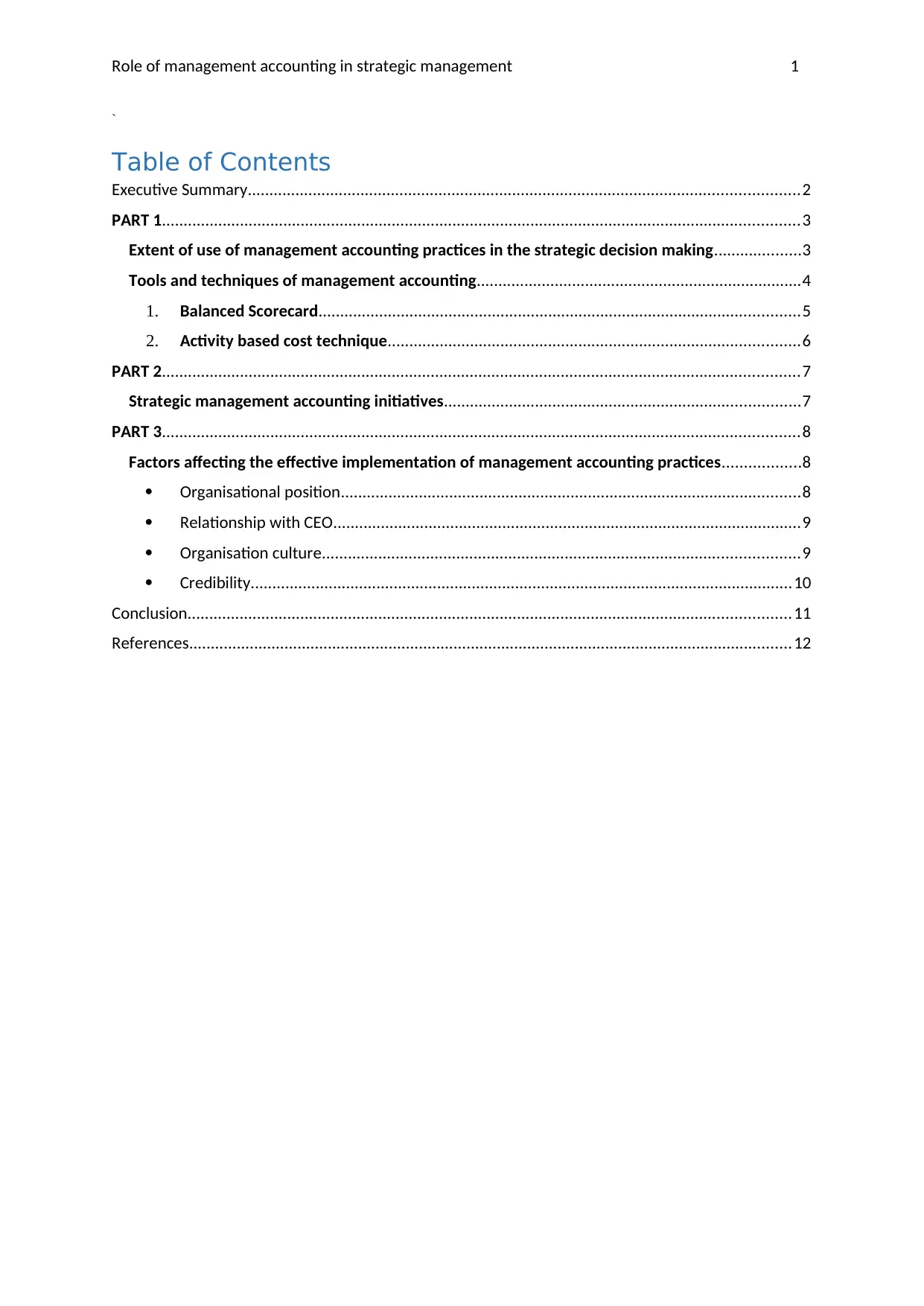
Role of management accounting in strategic management 1
`
Table of Contents
Executive Summary...............................................................................................................................2
PART 1...................................................................................................................................................3
Extent of use of management accounting practices in the strategic decision making....................3
Tools and techniques of management accounting...........................................................................4
1. Balanced Scorecard...............................................................................................................5
2. Activity based cost technique...............................................................................................6
PART 2...................................................................................................................................................7
Strategic management accounting initiatives..................................................................................7
PART 3...................................................................................................................................................8
Factors affecting the effective implementation of management accounting practices..................8
Organisational position..........................................................................................................8
Relationship with CEO............................................................................................................9
Organisation culture..............................................................................................................9
Credibility.............................................................................................................................10
Conclusion...........................................................................................................................................11
References...........................................................................................................................................12
`
Table of Contents
Executive Summary...............................................................................................................................2
PART 1...................................................................................................................................................3
Extent of use of management accounting practices in the strategic decision making....................3
Tools and techniques of management accounting...........................................................................4
1. Balanced Scorecard...............................................................................................................5
2. Activity based cost technique...............................................................................................6
PART 2...................................................................................................................................................7
Strategic management accounting initiatives..................................................................................7
PART 3...................................................................................................................................................8
Factors affecting the effective implementation of management accounting practices..................8
Organisational position..........................................................................................................8
Relationship with CEO............................................................................................................9
Organisation culture..............................................................................................................9
Credibility.............................................................................................................................10
Conclusion...........................................................................................................................................11
References...........................................................................................................................................12
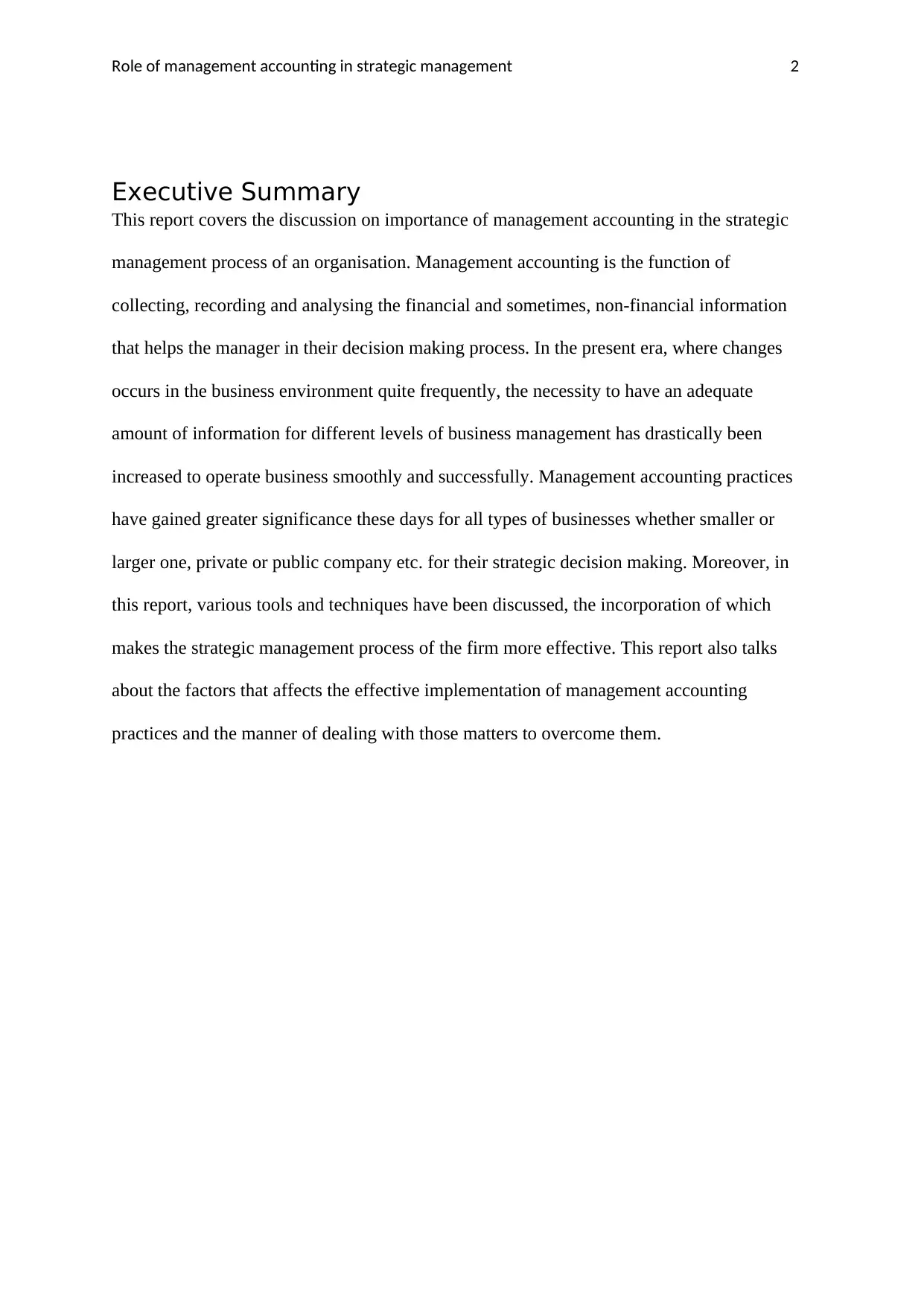
Role of management accounting in strategic management 2
Executive Summary
This report covers the discussion on importance of management accounting in the strategic
management process of an organisation. Management accounting is the function of
collecting, recording and analysing the financial and sometimes, non-financial information
that helps the manager in their decision making process. In the present era, where changes
occurs in the business environment quite frequently, the necessity to have an adequate
amount of information for different levels of business management has drastically been
increased to operate business smoothly and successfully. Management accounting practices
have gained greater significance these days for all types of businesses whether smaller or
larger one, private or public company etc. for their strategic decision making. Moreover, in
this report, various tools and techniques have been discussed, the incorporation of which
makes the strategic management process of the firm more effective. This report also talks
about the factors that affects the effective implementation of management accounting
practices and the manner of dealing with those matters to overcome them.
Executive Summary
This report covers the discussion on importance of management accounting in the strategic
management process of an organisation. Management accounting is the function of
collecting, recording and analysing the financial and sometimes, non-financial information
that helps the manager in their decision making process. In the present era, where changes
occurs in the business environment quite frequently, the necessity to have an adequate
amount of information for different levels of business management has drastically been
increased to operate business smoothly and successfully. Management accounting practices
have gained greater significance these days for all types of businesses whether smaller or
larger one, private or public company etc. for their strategic decision making. Moreover, in
this report, various tools and techniques have been discussed, the incorporation of which
makes the strategic management process of the firm more effective. This report also talks
about the factors that affects the effective implementation of management accounting
practices and the manner of dealing with those matters to overcome them.
⊘ This is a preview!⊘
Do you want full access?
Subscribe today to unlock all pages.

Trusted by 1+ million students worldwide
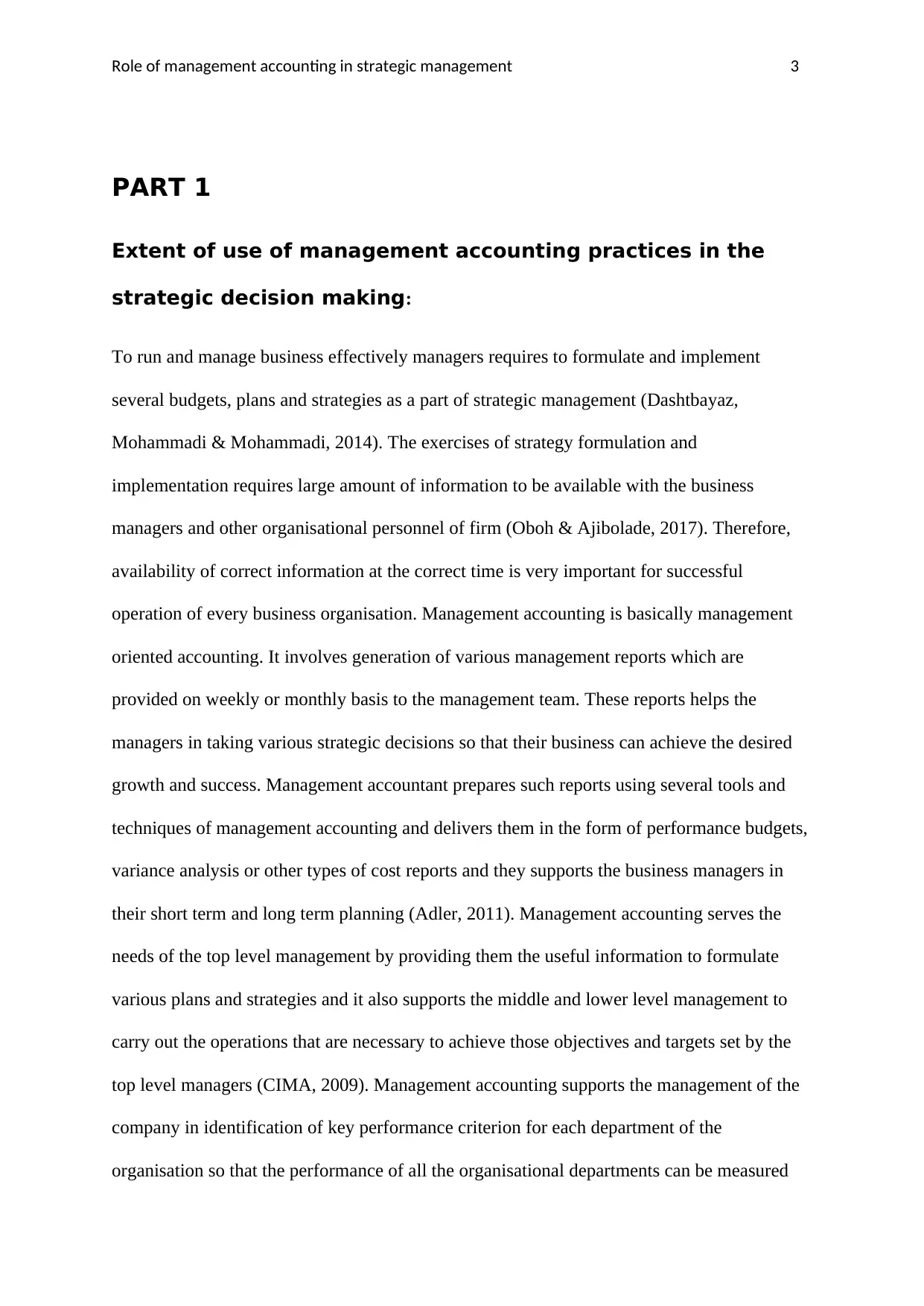
Role of management accounting in strategic management 3
PART 1
Extent of use of management accounting practices in the
strategic decision making:
To run and manage business effectively managers requires to formulate and implement
several budgets, plans and strategies as a part of strategic management (Dashtbayaz,
Mohammadi & Mohammadi, 2014). The exercises of strategy formulation and
implementation requires large amount of information to be available with the business
managers and other organisational personnel of firm (Oboh & Ajibolade, 2017). Therefore,
availability of correct information at the correct time is very important for successful
operation of every business organisation. Management accounting is basically management
oriented accounting. It involves generation of various management reports which are
provided on weekly or monthly basis to the management team. These reports helps the
managers in taking various strategic decisions so that their business can achieve the desired
growth and success. Management accountant prepares such reports using several tools and
techniques of management accounting and delivers them in the form of performance budgets,
variance analysis or other types of cost reports and they supports the business managers in
their short term and long term planning (Adler, 2011). Management accounting serves the
needs of the top level management by providing them the useful information to formulate
various plans and strategies and it also supports the middle and lower level management to
carry out the operations that are necessary to achieve those objectives and targets set by the
top level managers (CIMA, 2009). Management accounting supports the management of the
company in identification of key performance criterion for each department of the
organisation so that the performance of all the organisational departments can be measured
PART 1
Extent of use of management accounting practices in the
strategic decision making:
To run and manage business effectively managers requires to formulate and implement
several budgets, plans and strategies as a part of strategic management (Dashtbayaz,
Mohammadi & Mohammadi, 2014). The exercises of strategy formulation and
implementation requires large amount of information to be available with the business
managers and other organisational personnel of firm (Oboh & Ajibolade, 2017). Therefore,
availability of correct information at the correct time is very important for successful
operation of every business organisation. Management accounting is basically management
oriented accounting. It involves generation of various management reports which are
provided on weekly or monthly basis to the management team. These reports helps the
managers in taking various strategic decisions so that their business can achieve the desired
growth and success. Management accountant prepares such reports using several tools and
techniques of management accounting and delivers them in the form of performance budgets,
variance analysis or other types of cost reports and they supports the business managers in
their short term and long term planning (Adler, 2011). Management accounting serves the
needs of the top level management by providing them the useful information to formulate
various plans and strategies and it also supports the middle and lower level management to
carry out the operations that are necessary to achieve those objectives and targets set by the
top level managers (CIMA, 2009). Management accounting supports the management of the
company in identification of key performance criterion for each department of the
organisation so that the performance of all the organisational departments can be measured
Paraphrase This Document
Need a fresh take? Get an instant paraphrase of this document with our AI Paraphraser
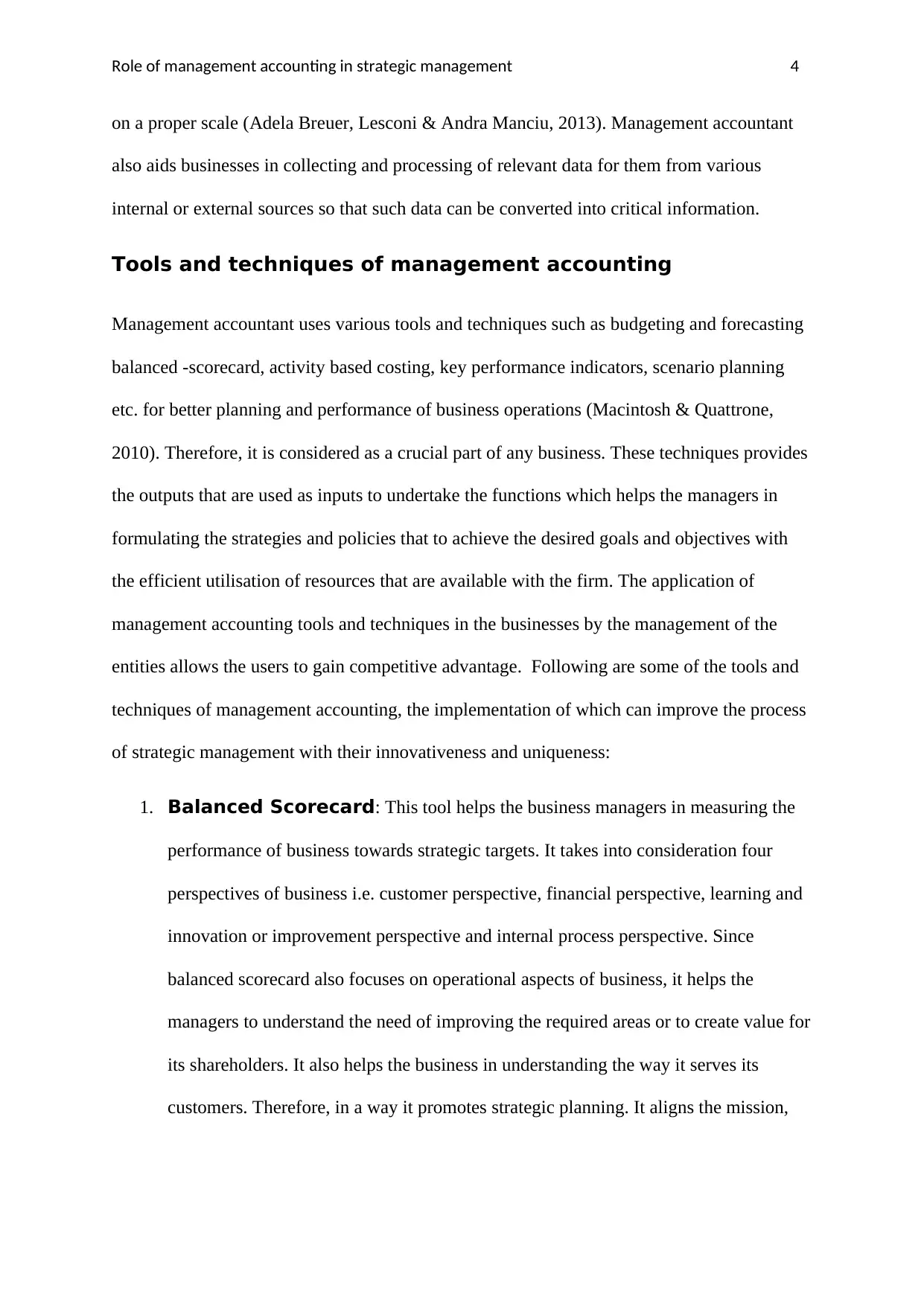
Role of management accounting in strategic management 4
on a proper scale (Adela Breuer, Lesconi & Andra Manciu, 2013). Management accountant
also aids businesses in collecting and processing of relevant data for them from various
internal or external sources so that such data can be converted into critical information.
Tools and techniques of management accounting
Management accountant uses various tools and techniques such as budgeting and forecasting
balanced -scorecard, activity based costing, key performance indicators, scenario planning
etc. for better planning and performance of business operations (Macintosh & Quattrone,
2010). Therefore, it is considered as a crucial part of any business. These techniques provides
the outputs that are used as inputs to undertake the functions which helps the managers in
formulating the strategies and policies that to achieve the desired goals and objectives with
the efficient utilisation of resources that are available with the firm. The application of
management accounting tools and techniques in the businesses by the management of the
entities allows the users to gain competitive advantage. Following are some of the tools and
techniques of management accounting, the implementation of which can improve the process
of strategic management with their innovativeness and uniqueness:
1. Balanced Scorecard: This tool helps the business managers in measuring the
performance of business towards strategic targets. It takes into consideration four
perspectives of business i.e. customer perspective, financial perspective, learning and
innovation or improvement perspective and internal process perspective. Since
balanced scorecard also focuses on operational aspects of business, it helps the
managers to understand the need of improving the required areas or to create value for
its shareholders. It also helps the business in understanding the way it serves its
customers. Therefore, in a way it promotes strategic planning. It aligns the mission,
on a proper scale (Adela Breuer, Lesconi & Andra Manciu, 2013). Management accountant
also aids businesses in collecting and processing of relevant data for them from various
internal or external sources so that such data can be converted into critical information.
Tools and techniques of management accounting
Management accountant uses various tools and techniques such as budgeting and forecasting
balanced -scorecard, activity based costing, key performance indicators, scenario planning
etc. for better planning and performance of business operations (Macintosh & Quattrone,
2010). Therefore, it is considered as a crucial part of any business. These techniques provides
the outputs that are used as inputs to undertake the functions which helps the managers in
formulating the strategies and policies that to achieve the desired goals and objectives with
the efficient utilisation of resources that are available with the firm. The application of
management accounting tools and techniques in the businesses by the management of the
entities allows the users to gain competitive advantage. Following are some of the tools and
techniques of management accounting, the implementation of which can improve the process
of strategic management with their innovativeness and uniqueness:
1. Balanced Scorecard: This tool helps the business managers in measuring the
performance of business towards strategic targets. It takes into consideration four
perspectives of business i.e. customer perspective, financial perspective, learning and
innovation or improvement perspective and internal process perspective. Since
balanced scorecard also focuses on operational aspects of business, it helps the
managers to understand the need of improving the required areas or to create value for
its shareholders. It also helps the business in understanding the way it serves its
customers. Therefore, in a way it promotes strategic planning. It aligns the mission,
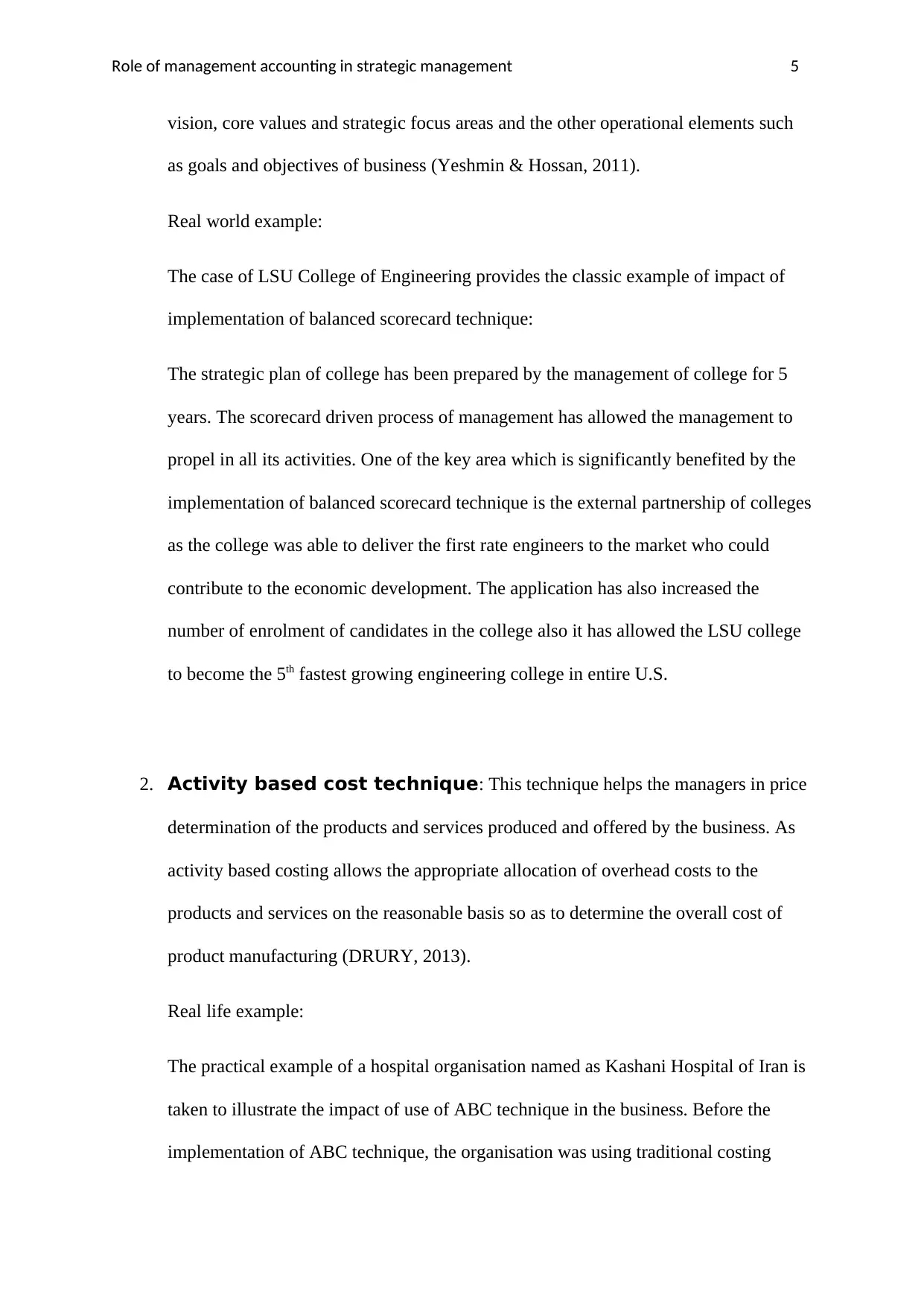
Role of management accounting in strategic management 5
vision, core values and strategic focus areas and the other operational elements such
as goals and objectives of business (Yeshmin & Hossan, 2011).
Real world example:
The case of LSU College of Engineering provides the classic example of impact of
implementation of balanced scorecard technique:
The strategic plan of college has been prepared by the management of college for 5
years. The scorecard driven process of management has allowed the management to
propel in all its activities. One of the key area which is significantly benefited by the
implementation of balanced scorecard technique is the external partnership of colleges
as the college was able to deliver the first rate engineers to the market who could
contribute to the economic development. The application has also increased the
number of enrolment of candidates in the college also it has allowed the LSU college
to become the 5th fastest growing engineering college in entire U.S.
2. Activity based cost technique: This technique helps the managers in price
determination of the products and services produced and offered by the business. As
activity based costing allows the appropriate allocation of overhead costs to the
products and services on the reasonable basis so as to determine the overall cost of
product manufacturing (DRURY, 2013).
Real life example:
The practical example of a hospital organisation named as Kashani Hospital of Iran is
taken to illustrate the impact of use of ABC technique in the business. Before the
implementation of ABC technique, the organisation was using traditional costing
vision, core values and strategic focus areas and the other operational elements such
as goals and objectives of business (Yeshmin & Hossan, 2011).
Real world example:
The case of LSU College of Engineering provides the classic example of impact of
implementation of balanced scorecard technique:
The strategic plan of college has been prepared by the management of college for 5
years. The scorecard driven process of management has allowed the management to
propel in all its activities. One of the key area which is significantly benefited by the
implementation of balanced scorecard technique is the external partnership of colleges
as the college was able to deliver the first rate engineers to the market who could
contribute to the economic development. The application has also increased the
number of enrolment of candidates in the college also it has allowed the LSU college
to become the 5th fastest growing engineering college in entire U.S.
2. Activity based cost technique: This technique helps the managers in price
determination of the products and services produced and offered by the business. As
activity based costing allows the appropriate allocation of overhead costs to the
products and services on the reasonable basis so as to determine the overall cost of
product manufacturing (DRURY, 2013).
Real life example:
The practical example of a hospital organisation named as Kashani Hospital of Iran is
taken to illustrate the impact of use of ABC technique in the business. Before the
implementation of ABC technique, the organisation was using traditional costing
⊘ This is a preview!⊘
Do you want full access?
Subscribe today to unlock all pages.

Trusted by 1+ million students worldwide
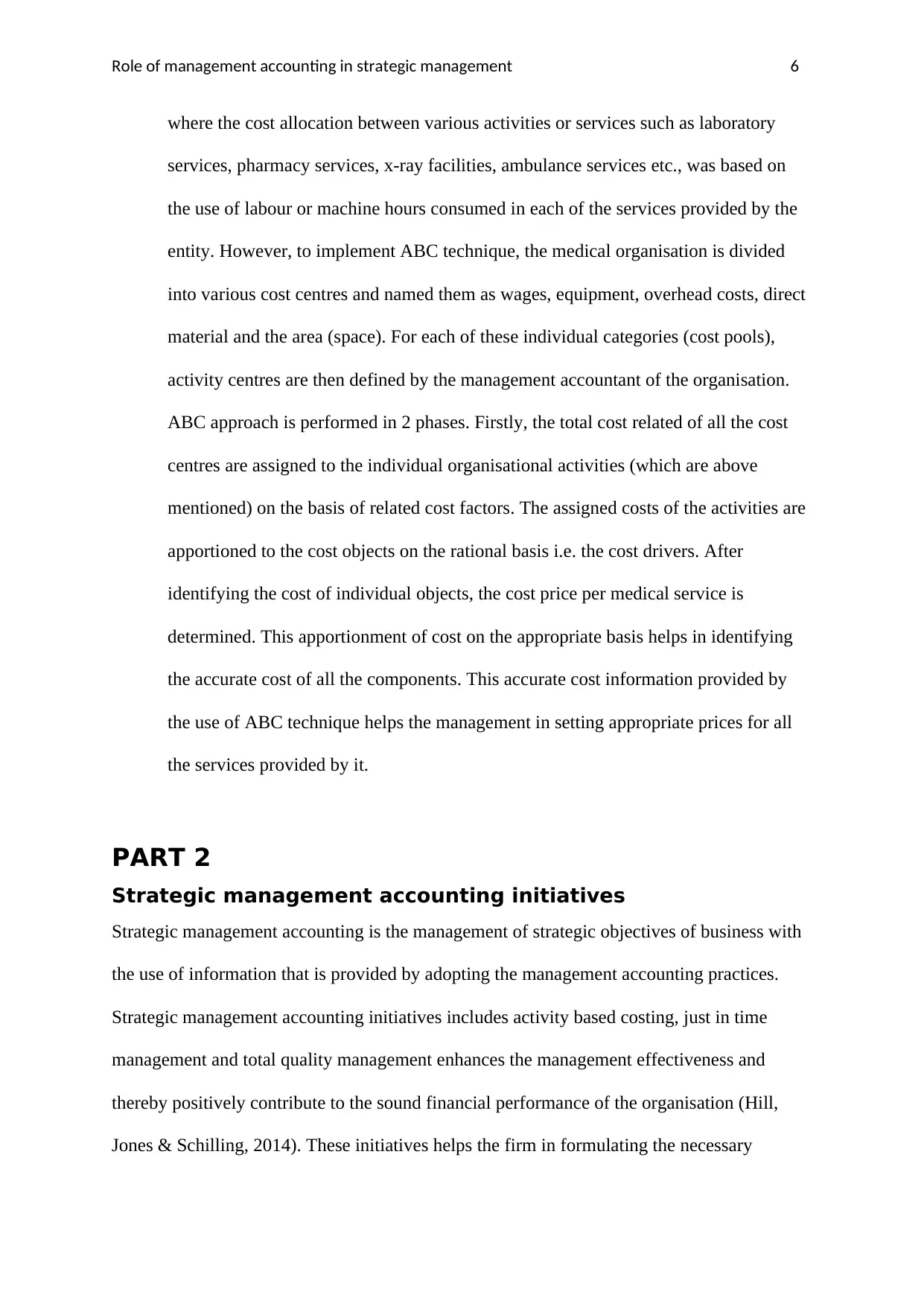
Role of management accounting in strategic management 6
where the cost allocation between various activities or services such as laboratory
services, pharmacy services, x-ray facilities, ambulance services etc., was based on
the use of labour or machine hours consumed in each of the services provided by the
entity. However, to implement ABC technique, the medical organisation is divided
into various cost centres and named them as wages, equipment, overhead costs, direct
material and the area (space). For each of these individual categories (cost pools),
activity centres are then defined by the management accountant of the organisation.
ABC approach is performed in 2 phases. Firstly, the total cost related of all the cost
centres are assigned to the individual organisational activities (which are above
mentioned) on the basis of related cost factors. The assigned costs of the activities are
apportioned to the cost objects on the rational basis i.e. the cost drivers. After
identifying the cost of individual objects, the cost price per medical service is
determined. This apportionment of cost on the appropriate basis helps in identifying
the accurate cost of all the components. This accurate cost information provided by
the use of ABC technique helps the management in setting appropriate prices for all
the services provided by it.
PART 2
Strategic management accounting initiatives
Strategic management accounting is the management of strategic objectives of business with
the use of information that is provided by adopting the management accounting practices.
Strategic management accounting initiatives includes activity based costing, just in time
management and total quality management enhances the management effectiveness and
thereby positively contribute to the sound financial performance of the organisation (Hill,
Jones & Schilling, 2014). These initiatives helps the firm in formulating the necessary
where the cost allocation between various activities or services such as laboratory
services, pharmacy services, x-ray facilities, ambulance services etc., was based on
the use of labour or machine hours consumed in each of the services provided by the
entity. However, to implement ABC technique, the medical organisation is divided
into various cost centres and named them as wages, equipment, overhead costs, direct
material and the area (space). For each of these individual categories (cost pools),
activity centres are then defined by the management accountant of the organisation.
ABC approach is performed in 2 phases. Firstly, the total cost related of all the cost
centres are assigned to the individual organisational activities (which are above
mentioned) on the basis of related cost factors. The assigned costs of the activities are
apportioned to the cost objects on the rational basis i.e. the cost drivers. After
identifying the cost of individual objects, the cost price per medical service is
determined. This apportionment of cost on the appropriate basis helps in identifying
the accurate cost of all the components. This accurate cost information provided by
the use of ABC technique helps the management in setting appropriate prices for all
the services provided by it.
PART 2
Strategic management accounting initiatives
Strategic management accounting is the management of strategic objectives of business with
the use of information that is provided by adopting the management accounting practices.
Strategic management accounting initiatives includes activity based costing, just in time
management and total quality management enhances the management effectiveness and
thereby positively contribute to the sound financial performance of the organisation (Hill,
Jones & Schilling, 2014). These initiatives helps the firm in formulating the necessary
Paraphrase This Document
Need a fresh take? Get an instant paraphrase of this document with our AI Paraphraser
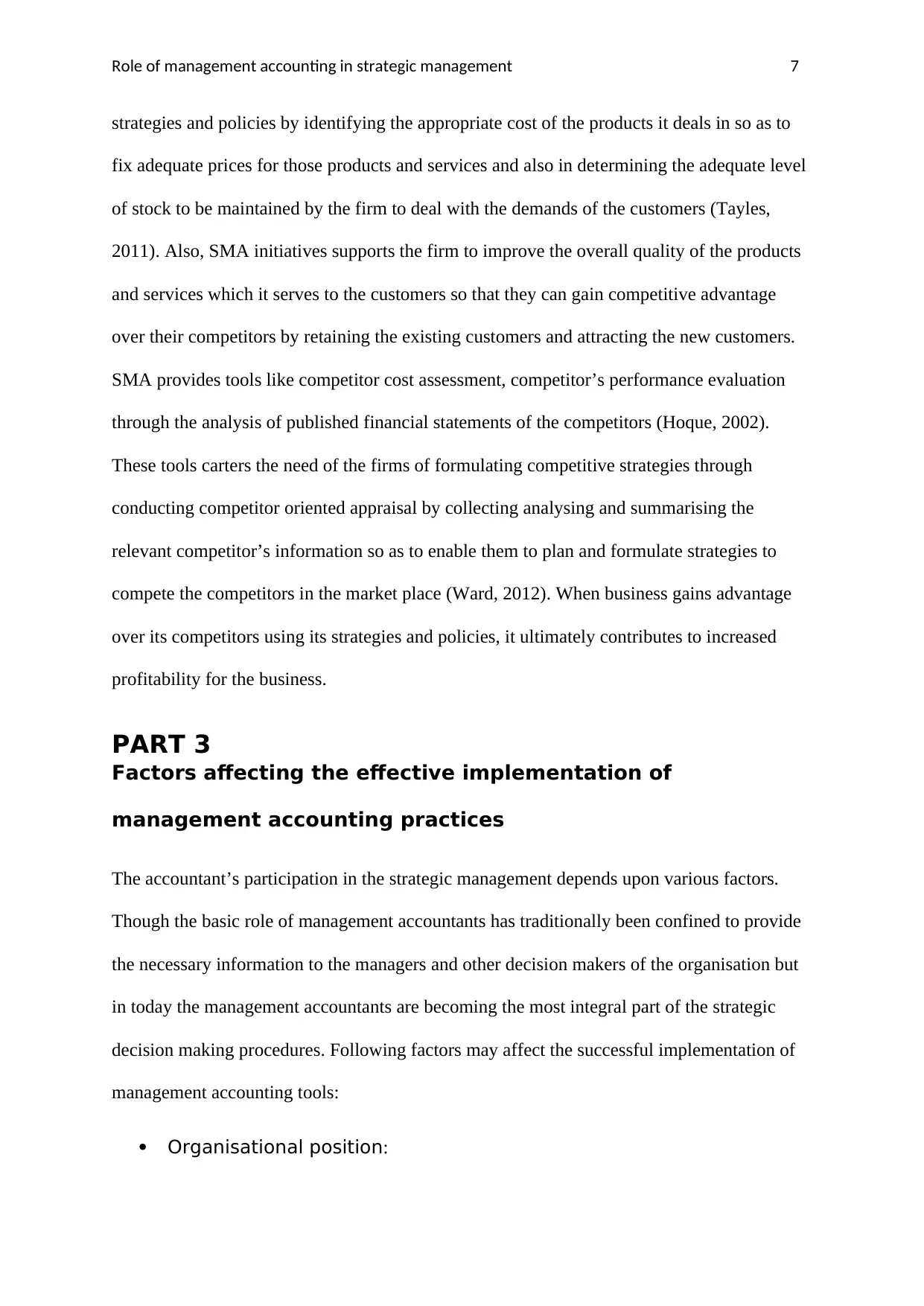
Role of management accounting in strategic management 7
strategies and policies by identifying the appropriate cost of the products it deals in so as to
fix adequate prices for those products and services and also in determining the adequate level
of stock to be maintained by the firm to deal with the demands of the customers (Tayles,
2011). Also, SMA initiatives supports the firm to improve the overall quality of the products
and services which it serves to the customers so that they can gain competitive advantage
over their competitors by retaining the existing customers and attracting the new customers.
SMA provides tools like competitor cost assessment, competitor’s performance evaluation
through the analysis of published financial statements of the competitors (Hoque, 2002).
These tools carters the need of the firms of formulating competitive strategies through
conducting competitor oriented appraisal by collecting analysing and summarising the
relevant competitor’s information so as to enable them to plan and formulate strategies to
compete the competitors in the market place (Ward, 2012). When business gains advantage
over its competitors using its strategies and policies, it ultimately contributes to increased
profitability for the business.
PART 3
Factors affecting the effective implementation of
management accounting practices
The accountant’s participation in the strategic management depends upon various factors.
Though the basic role of management accountants has traditionally been confined to provide
the necessary information to the managers and other decision makers of the organisation but
in today the management accountants are becoming the most integral part of the strategic
decision making procedures. Following factors may affect the successful implementation of
management accounting tools:
Organisational position:
strategies and policies by identifying the appropriate cost of the products it deals in so as to
fix adequate prices for those products and services and also in determining the adequate level
of stock to be maintained by the firm to deal with the demands of the customers (Tayles,
2011). Also, SMA initiatives supports the firm to improve the overall quality of the products
and services which it serves to the customers so that they can gain competitive advantage
over their competitors by retaining the existing customers and attracting the new customers.
SMA provides tools like competitor cost assessment, competitor’s performance evaluation
through the analysis of published financial statements of the competitors (Hoque, 2002).
These tools carters the need of the firms of formulating competitive strategies through
conducting competitor oriented appraisal by collecting analysing and summarising the
relevant competitor’s information so as to enable them to plan and formulate strategies to
compete the competitors in the market place (Ward, 2012). When business gains advantage
over its competitors using its strategies and policies, it ultimately contributes to increased
profitability for the business.
PART 3
Factors affecting the effective implementation of
management accounting practices
The accountant’s participation in the strategic management depends upon various factors.
Though the basic role of management accountants has traditionally been confined to provide
the necessary information to the managers and other decision makers of the organisation but
in today the management accountants are becoming the most integral part of the strategic
decision making procedures. Following factors may affect the successful implementation of
management accounting tools:
Organisational position:
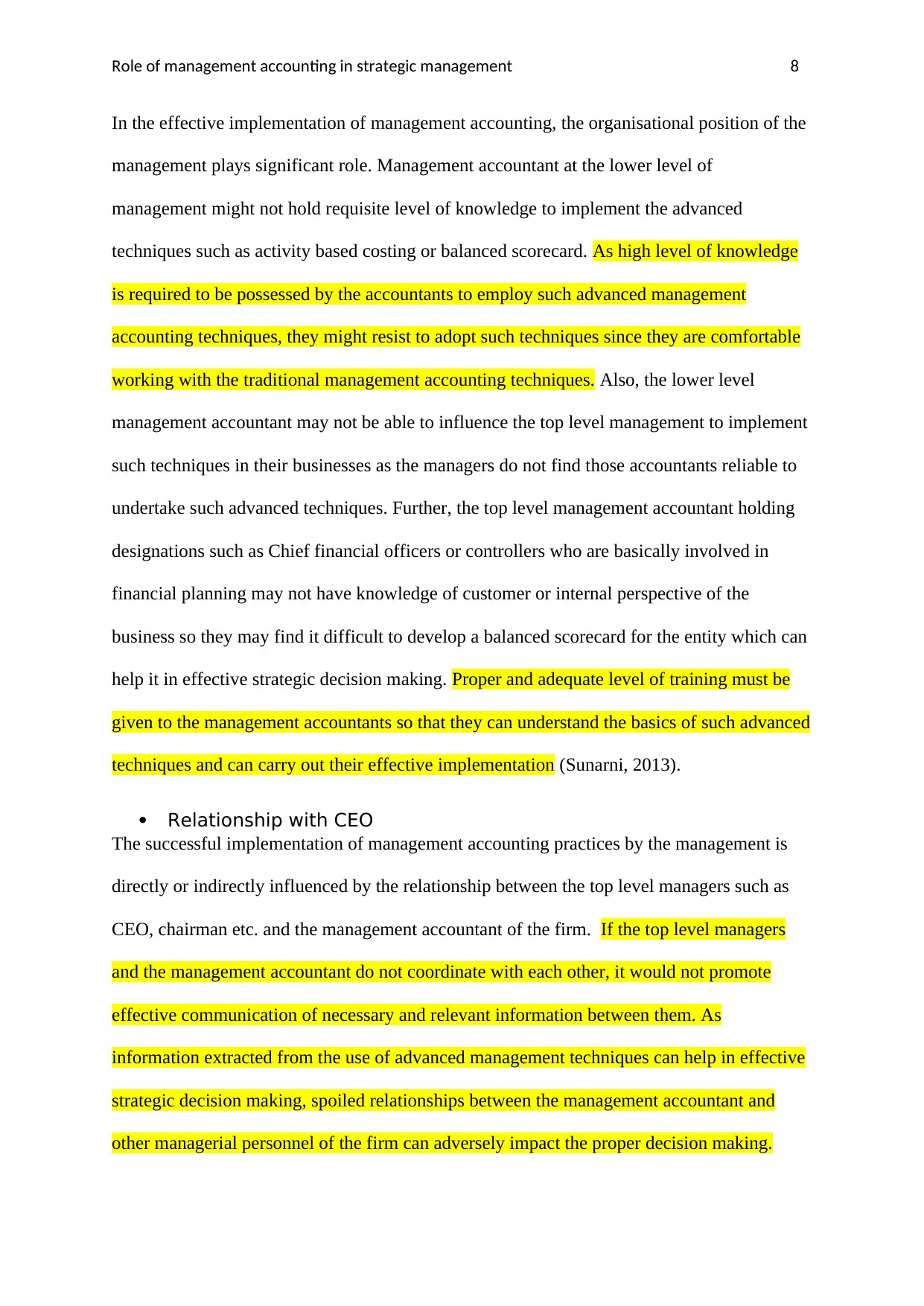
Role of management accounting in strategic management 8
In the effective implementation of management accounting, the organisational position of the
management plays significant role. Management accountant at the lower level of
management might not hold requisite level of knowledge to implement the advanced
techniques such as activity based costing or balanced scorecard. As high level of knowledge
is required to be possessed by the accountants to employ such advanced management
accounting techniques, they might resist to adopt such techniques since they are comfortable
working with the traditional management accounting techniques. Also, the lower level
management accountant may not be able to influence the top level management to implement
such techniques in their businesses as the managers do not find those accountants reliable to
undertake such advanced techniques. Further, the top level management accountant holding
designations such as Chief financial officers or controllers who are basically involved in
financial planning may not have knowledge of customer or internal perspective of the
business so they may find it difficult to develop a balanced scorecard for the entity which can
help it in effective strategic decision making. Proper and adequate level of training must be
given to the management accountants so that they can understand the basics of such advanced
techniques and can carry out their effective implementation (Sunarni, 2013).
Relationship with CEO
The successful implementation of management accounting practices by the management is
directly or indirectly influenced by the relationship between the top level managers such as
CEO, chairman etc. and the management accountant of the firm. If the top level managers
and the management accountant do not coordinate with each other, it would not promote
effective communication of necessary and relevant information between them. As
information extracted from the use of advanced management techniques can help in effective
strategic decision making, spoiled relationships between the management accountant and
other managerial personnel of the firm can adversely impact the proper decision making.
In the effective implementation of management accounting, the organisational position of the
management plays significant role. Management accountant at the lower level of
management might not hold requisite level of knowledge to implement the advanced
techniques such as activity based costing or balanced scorecard. As high level of knowledge
is required to be possessed by the accountants to employ such advanced management
accounting techniques, they might resist to adopt such techniques since they are comfortable
working with the traditional management accounting techniques. Also, the lower level
management accountant may not be able to influence the top level management to implement
such techniques in their businesses as the managers do not find those accountants reliable to
undertake such advanced techniques. Further, the top level management accountant holding
designations such as Chief financial officers or controllers who are basically involved in
financial planning may not have knowledge of customer or internal perspective of the
business so they may find it difficult to develop a balanced scorecard for the entity which can
help it in effective strategic decision making. Proper and adequate level of training must be
given to the management accountants so that they can understand the basics of such advanced
techniques and can carry out their effective implementation (Sunarni, 2013).
Relationship with CEO
The successful implementation of management accounting practices by the management is
directly or indirectly influenced by the relationship between the top level managers such as
CEO, chairman etc. and the management accountant of the firm. If the top level managers
and the management accountant do not coordinate with each other, it would not promote
effective communication of necessary and relevant information between them. As
information extracted from the use of advanced management techniques can help in effective
strategic decision making, spoiled relationships between the management accountant and
other managerial personnel of the firm can adversely impact the proper decision making.
⊘ This is a preview!⊘
Do you want full access?
Subscribe today to unlock all pages.

Trusted by 1+ million students worldwide
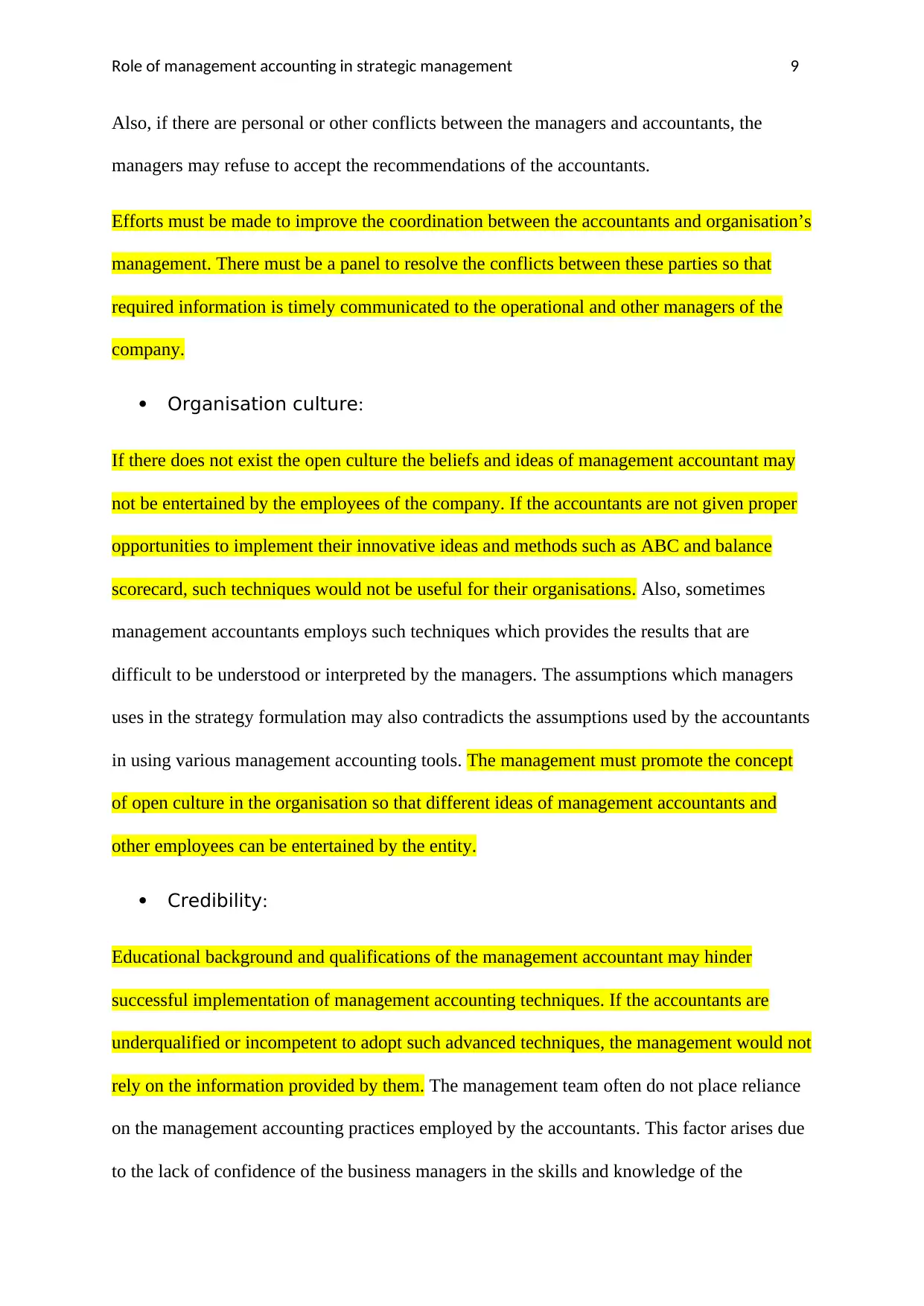
Role of management accounting in strategic management 9
Also, if there are personal or other conflicts between the managers and accountants, the
managers may refuse to accept the recommendations of the accountants.
Efforts must be made to improve the coordination between the accountants and organisation’s
management. There must be a panel to resolve the conflicts between these parties so that
required information is timely communicated to the operational and other managers of the
company.
Organisation culture:
If there does not exist the open culture the beliefs and ideas of management accountant may
not be entertained by the employees of the company. If the accountants are not given proper
opportunities to implement their innovative ideas and methods such as ABC and balance
scorecard, such techniques would not be useful for their organisations. Also, sometimes
management accountants employs such techniques which provides the results that are
difficult to be understood or interpreted by the managers. The assumptions which managers
uses in the strategy formulation may also contradicts the assumptions used by the accountants
in using various management accounting tools. The management must promote the concept
of open culture in the organisation so that different ideas of management accountants and
other employees can be entertained by the entity.
Credibility:
Educational background and qualifications of the management accountant may hinder
successful implementation of management accounting techniques. If the accountants are
underqualified or incompetent to adopt such advanced techniques, the management would not
rely on the information provided by them. The management team often do not place reliance
on the management accounting practices employed by the accountants. This factor arises due
to the lack of confidence of the business managers in the skills and knowledge of the
Also, if there are personal or other conflicts between the managers and accountants, the
managers may refuse to accept the recommendations of the accountants.
Efforts must be made to improve the coordination between the accountants and organisation’s
management. There must be a panel to resolve the conflicts between these parties so that
required information is timely communicated to the operational and other managers of the
company.
Organisation culture:
If there does not exist the open culture the beliefs and ideas of management accountant may
not be entertained by the employees of the company. If the accountants are not given proper
opportunities to implement their innovative ideas and methods such as ABC and balance
scorecard, such techniques would not be useful for their organisations. Also, sometimes
management accountants employs such techniques which provides the results that are
difficult to be understood or interpreted by the managers. The assumptions which managers
uses in the strategy formulation may also contradicts the assumptions used by the accountants
in using various management accounting tools. The management must promote the concept
of open culture in the organisation so that different ideas of management accountants and
other employees can be entertained by the entity.
Credibility:
Educational background and qualifications of the management accountant may hinder
successful implementation of management accounting techniques. If the accountants are
underqualified or incompetent to adopt such advanced techniques, the management would not
rely on the information provided by them. The management team often do not place reliance
on the management accounting practices employed by the accountants. This factor arises due
to the lack of confidence of the business managers in the skills and knowledge of the
Paraphrase This Document
Need a fresh take? Get an instant paraphrase of this document with our AI Paraphraser
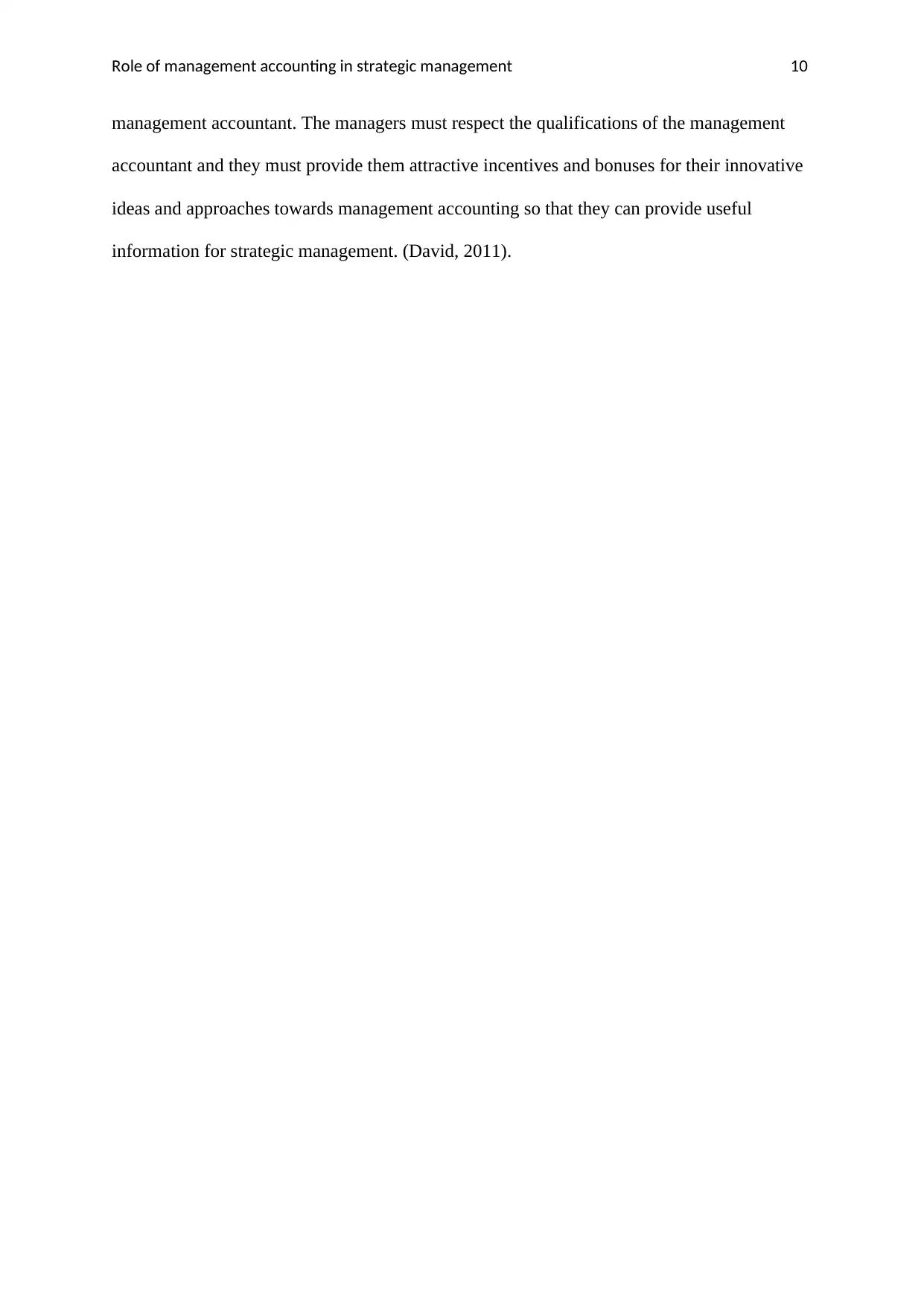
Role of management accounting in strategic management 10
management accountant. The managers must respect the qualifications of the management
accountant and they must provide them attractive incentives and bonuses for their innovative
ideas and approaches towards management accounting so that they can provide useful
information for strategic management. (David, 2011).
management accountant. The managers must respect the qualifications of the management
accountant and they must provide them attractive incentives and bonuses for their innovative
ideas and approaches towards management accounting so that they can provide useful
information for strategic management. (David, 2011).
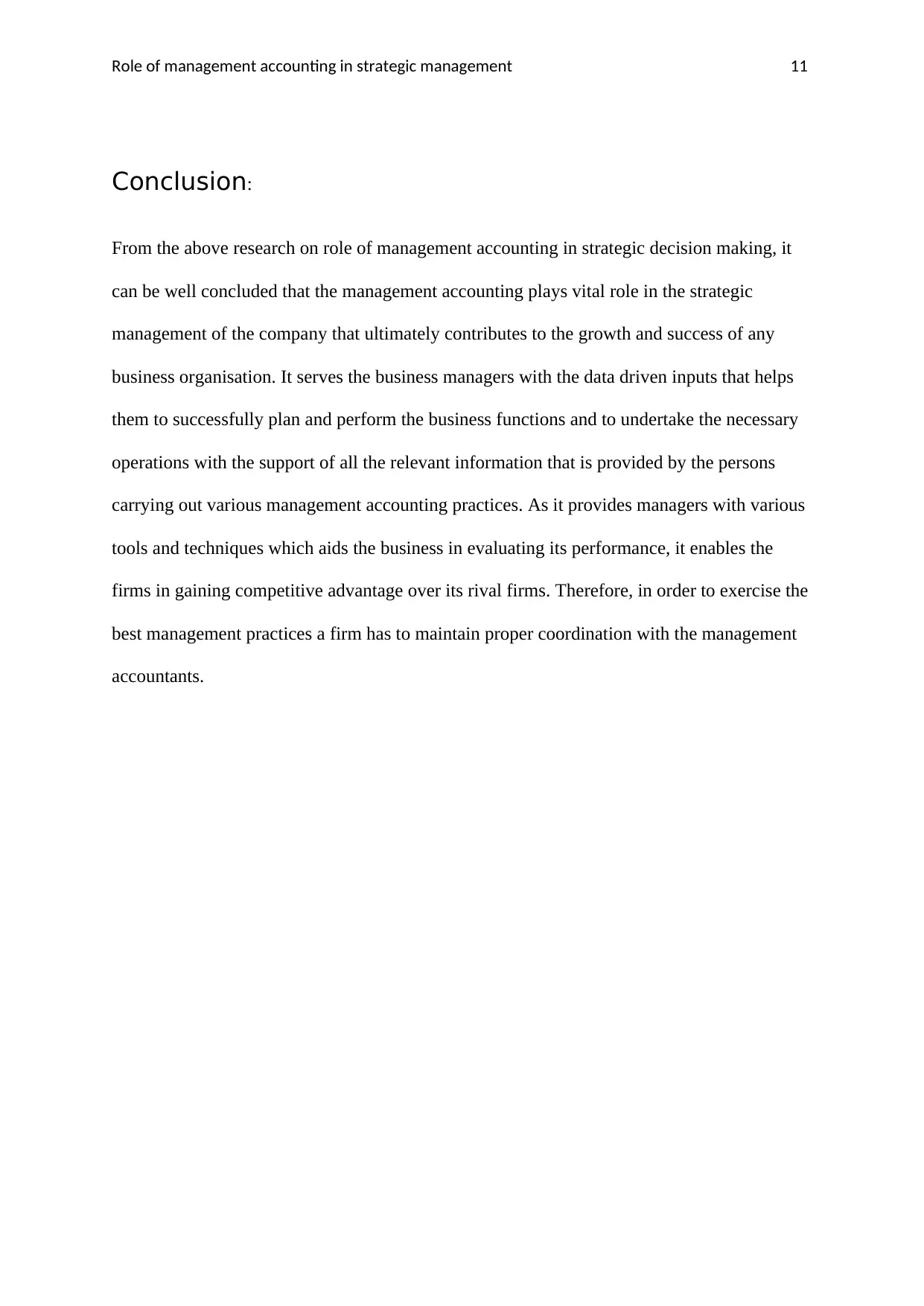
Role of management accounting in strategic management 11
Conclusion:
From the above research on role of management accounting in strategic decision making, it
can be well concluded that the management accounting plays vital role in the strategic
management of the company that ultimately contributes to the growth and success of any
business organisation. It serves the business managers with the data driven inputs that helps
them to successfully plan and perform the business functions and to undertake the necessary
operations with the support of all the relevant information that is provided by the persons
carrying out various management accounting practices. As it provides managers with various
tools and techniques which aids the business in evaluating its performance, it enables the
firms in gaining competitive advantage over its rival firms. Therefore, in order to exercise the
best management practices a firm has to maintain proper coordination with the management
accountants.
Conclusion:
From the above research on role of management accounting in strategic decision making, it
can be well concluded that the management accounting plays vital role in the strategic
management of the company that ultimately contributes to the growth and success of any
business organisation. It serves the business managers with the data driven inputs that helps
them to successfully plan and perform the business functions and to undertake the necessary
operations with the support of all the relevant information that is provided by the persons
carrying out various management accounting practices. As it provides managers with various
tools and techniques which aids the business in evaluating its performance, it enables the
firms in gaining competitive advantage over its rival firms. Therefore, in order to exercise the
best management practices a firm has to maintain proper coordination with the management
accountants.
⊘ This is a preview!⊘
Do you want full access?
Subscribe today to unlock all pages.

Trusted by 1+ million students worldwide
1 out of 14
Related Documents
Your All-in-One AI-Powered Toolkit for Academic Success.
+13062052269
info@desklib.com
Available 24*7 on WhatsApp / Email
![[object Object]](/_next/static/media/star-bottom.7253800d.svg)
Unlock your academic potential
Copyright © 2020–2026 A2Z Services. All Rights Reserved. Developed and managed by ZUCOL.





